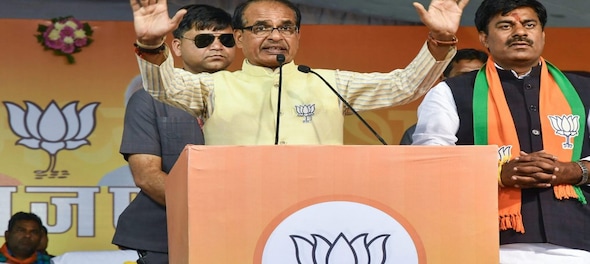
The fate of Shivraj Singh Chouhan led Bharatiya Janata Party government in Madhya Pradesh rests on the upcoming by-polls to be held on November 3. In December 2018, when a Congress government came to power after three successive election victories for the BJP, it was widely believed that the voters wanted a change. However, this change in Madhya Pradesh was short-lived as senior Congress leader Jyotiraditya Scindia crossed over to the BJP along with as many as twenty-five MLAs in March this year. This led to a fall of the Kamal Nath government and became another addition to the list of states— Karnataka, Goa and Manipur—that Congress lost due to defections. How are these by-polls likely to play out for both the parties?
Currently, in the 231 seat Madhya Pradesh assembly, the ruling BJP coalition has 111 seats including four independents. To meet the minimum majority mark, the BJP just needs five more seats whereas Congress needs to win all the by-poll seats. It will still need to win twenty-five seats even with the support of SP and BSP MLAs. Furthermore, sixteen of these constituencies are located in the Gwalior-Chambal region which is a Scindia strong-hold. Thus, even at outset, Congress has slim chances of staging a comeback.
Although BJP and Congress received the same vote share in the last election, a different picture emerges once we look closely into these by-poll constituencies.
In the 2018 election, Congress had almost a ten percentage points lead over the BJP in these constituencies. In addition, the Congress won many of these seats convincingly as it had a lead of more than ten percent on twelve of these. However, in the 2013 election, the BJP had won twenty out of these twenty-eight constituencies.
Since one-third of these constituencies are reserved seats for SC/STs, both parties are trying to mobilise Dalit votes. For this reason, it is likely that the contest will emerge as a tripolar in at least a few constituencies. In the last election, BSP stood second in two of these constituencies—Joura and Pohari. In the 2018 election, it won another two seats—Dimani and Ambah. The BSP which rarely contests by-polls has put candidates on all these seats except one. It remains to be seen if the party plays a spoiler for the Congress by fragmenting Dalit votes.
Does being the ruling party at both the state and the centre increase the BJP’s fortunes of winning these seats? An analysis of by-polls in India over more than six decades by Rahul Verma and Pranav Gupta shows that the incumbent party in the state is more likely to win by-polls as compared to the incumbent party at the national level. Similarly, when the incumbent party at the state and centre are different, the incumbent party is twice as likely to win a by-poll election seat than its competitor. But, when the incumbent party at the centre and state is the same, the party is more likely to win the by-poll than its competitor. Thus, if past trends persist, the odds are stacked in favour of the BJP.
BJP has given tickets to all the twenty-five defected MLAs. How do we expect the voters to respond to these defectors? Will they punish them for dismantling their verdict? Congress is hoping to capitalise on the general resentment against the betrayal of the election mandate. In the Karnataka by-polls followed by the defection of Congress MLAs, ten out of eleven defectors were able to get re-elected. On the other hand, in the by-polls held earlier this year in Haryana and Madhya Pradesh defectors were voted out by the people. Given these contradictory verdicts, it is unclear who would gain from the defections.
In many parts of the world, by-election results are seen as a referendum on the performance of the incumbent government. Within the last few months, the pandemic has reshaped the lives of many and there has been a mixed reaction on the government's response to the pandemic. The presumed lower turnout associated with by-polls usually along with the compounded effect of the pandemic, this high stake election is unlikely to produce any big change. Given the arithmetic of the legislative assembly, Congress will find it hard to return to power.
—Abdul Najah is a research assistant at the Centre for Policy Research, New Delhi. The views expressed are personal
(Edited by : Ajay Vaishnav)
First Published: Nov 2, 2020 6:13 PM IST
Check out our in-depth Market Coverage, Business News & get real-time Stock Market Updates on CNBC-TV18. Also, Watch our channels CNBC-TV18, CNBC Awaaz and CNBC Bajar Live on-the-go!


Meet Amritpal Singh, the separatist leader contesting Lok Sabha polls from Punjab's Khadoor Sahib
Apr 27, 2024 7:18 PM
Karnataka BJP candidate K Sudhakar booked for attempting to bribe IAS officer to release money seized by EC
Apr 27, 2024 6:08 PM
Vizag as executive capital, hike in welfare pensions: Key points in YSRCP's election manifesto
Apr 27, 2024 4:03 PM
Supreme Court verdict on EVMs — why upholding the voter’s trust is important
Apr 27, 2024 2:23 PM

